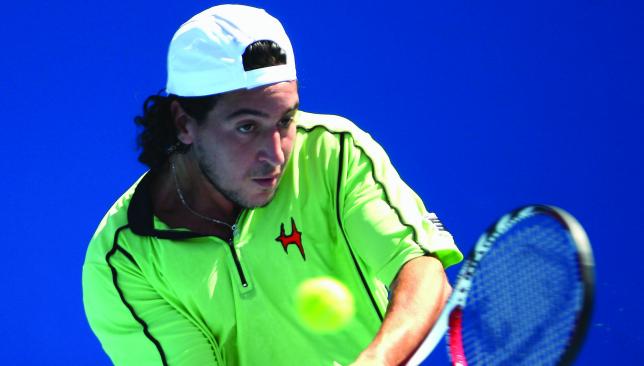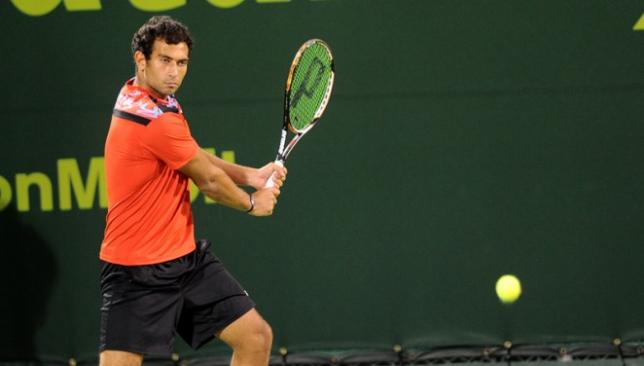
Almost 13 years ago, a 17-year-old Algerian, Lamine Ouahab, beat Rafael Nadal to reach the final of the boys’ singles event at Wimbledon.
A couple of years earlier, he had beaten Robin Soderling and Richard Gasquet en route to the semi-finals of the Roland Garros junior tournament.
He was a regular finalist at numerous Grade 1 junior events like the prestigious Eddie Herr tournament and ranked as high as No4 in the ITF world junior rankings.
But like many teenagers in tennis – particularly in the Arab world – Ouahab was unable to replicate such success on the men’s tour.
His highest ranking came in 2009 when he peaked at 114 and his career has witnessed bizarre interruptions as Ouahab would seemingly disappear from the tour for months before storming back with some impressive stretches of tennis.

Egyptian tennis star Mohamed Safwat facing harsh realities as he tries to make his mark
After winning a Futures title in Croatia last year in March, he announced he was switching nationalities and would start representing Morocco instead of Algeria, having acquired the passport through his Moroccan wife.
Ouahab then posted a disappointing 7-10 win-loss record in the remainder of the season, which he ended ranked 587 in the world.
He then started 2015 in emphatic fashion, clinching a Challenger title in Casablanca. Between March and April, he won 17 matches in a row, also in his adopted home country, to grab three Futures trophies and make a stunning run to the quarter-finals in the ATP tournament in Casablanca, where he upset the tournament’s top seed Guillermo Garcia Lopez, ranked No24 in the world, en route.
His streak saw him rise to No232 in the world, which earned him a spot in the Roland Garros qualifying. But instead of capitalising on the momentum from his impressive clay form, Ouahab played just one match – a qualifying round at a Challenger in Italy – in the six-week period leading up to the French Open and ended up losing a tight three-setter to Alejandro Falla in the first stage of qualification.
These sudden absences are not by choice, says Ouahab.
“Unfortunately when you are an Arab player, you have a lot of things to handle by yourself. This time, I had to wait for a visa for my wife for over three weeks, so I couldn’t practice much before the French Open,” Ouahab told Sport360.
“Sometimes it’s difficult to travel and pay the expenses, or get the papers ready. Let’s say when I disappear, it’s not voluntary.
“It’s been like this for so many years, so I just deal with it. It’s not fair, it shouldn’t be like this but there’s not much I can do about it. I’m sure had I played a couple of tournaments in the build-up to Roland Garros, I could have done much better but sometimes it’s like this. For Arab players, problems outside the court affect our tennis.
“Last year I couldn’t get a visa for the UK in time for Wimbledon so I couldn’t go. Sometimes I get it the day before, or on the same day.”
It is a real shame especially for someone who clearly has talent.
Spanish journalist Jose Izquierdo, of radio station Cadena SER, who watched Ouahab beat Garcia Lopez, described: “Watching Lamine play on clay is a real treat. Pure talent. One of those hidden gems of the ATP circuit.”
But Ouahab knows that talent alone can only get him so far. He moved to Barcelona when he was just 14 years old and trained there for many years. He still has the Spanish residency and is fluent in the language, but is currently based in Morocco for economic reasons.
“I haven’t had a coach for like five years now because I dropped out of the top 150 so I wasn’t making money like before. I don’t have a physical trainer, I don’t have a manager, I do everything myself and I can still compete with guys up to No20 in the world,” he explains.
“I don’t have sponsors of course, I don’t have help for the papers… it’s not excuses, it’s just the reality and I think 80 per cent of the players on the Tour don’t go through this.
“And as long as it stays like this, it’s going to be hard to get Arab champions in tennis.
“I’ve beaten so many good players and had a lot of good results, but it’s never been consistent because outside the court, the base is not consistent. It’s hard to have a programme, to travel. It’s really tough.
“I just need to play tournaments the whole year, that’s all I want to do. People don’t realise this in our countries, they don’t realise how tough the sport is.”
The lack of support from the Algerian tennis and sports authorities was the main reason that drove Ouahab to switch allegiance to Morocco – a country that has produced three top-25 players in the past in the form of Hicham Arazi, Younes El Aynaoui and Karim Alami.
With political tension between the neighbouring North African nations, the decision wasn’t easy but Ouahab knew it had to be done.
“Maybe I get not even 15 or 20 per cent of the budget I need to play but before that I was getting zero, so it’s a little better,” he says. “Of course I’m Algerian, both my parents are Algerian and all my family is practically from Algeria, but at a certain point you have to make some decisions. People don’t realise how much I sacrificed for my career.
“I sacrifice my family, my time, a lot of things. I was a very young player with great opportunities to play tennis. When I was 16 I made the semi-finals at Roland
Garros juniors, I was No4 in the world as a junior. I beat Rafa, Berdych, Gasquet… I had the opportunity to play for France, but I didn’t do it to keep playing for my country.
“But unfortunately, the federation, the ministry, the sponsors… nobody cares.”
Ouahab, now 30 and a new father, isn’t thinking of retirement. He believes the key is to focus on his passion for the sport.
“Firstly, I’m trying to enjoy tennis more. I have much more experience, so I’m accepting it all better,” he says.
“I’m going to try to play more tournaments. I had some good
results in the beginning of the year but I need to get back into the top 200 or top 150 to start making more money and maybe get a coach. I’ll take it step by step and keep trying.
“I’m not thinking about retirement at all right now. I’ve gone through so much and for me it doesn’t matter if I’m ranked 5000 or top 20. I will keep playing as long as I’m enjoying it.”